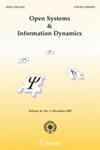On the Unraveling of Open Quantum Dynamics
IF 1.6
4区 物理与天体物理
Q3 PHYSICS, MATHEMATICAL
引用次数: 0
Abstract
It is well known that the state operator of an open quantum system can be generically represented as the solution of a time-local equation — a quantum master equation. Unraveling in quantum trajectories offers a picture of open system dynamics dual to solving master equations. In the unraveling picture, physical indicators are computed as Monte Carlo averages over a stochastic process valued in the Hilbert space of the system. This approach is particularly adapted to simulate systems in large Hilbert spaces. We show that the dynamics of an open quantum system generically admits an unraveling in the Hilbert space of the system described by a Markov process generated by ordinary stochastic differential equations for which rigorous concentration estimates are available. The unraveling can be equivalently formulated in terms of norm-preserving state vectors or in terms of linear “ostensible” processes trace preserving only on average. We illustrate the results in the case of a two level system in a simple boson environment. Next, we derive the state-of-the-art form of the Diósi-Gisin-Strunz Gaussian random ostensible state equation in the context of a model problem. This equation provides an exact unraveling of open systems in Gaussian environments. We compare and contrast the two unravelings and their potential for applications to quantum error mitigation.关于开放量子动力学的揭示
众所周知,开放量子系统的状态算子可以一般地表示为一个时间局部方程的解——量子主方程。量子轨迹的解开提供了一幅开放系统动力学的图像,它与解主方程是双重的。在展开图中,物理指标被计算为系统希尔伯特空间中随机过程的蒙特卡罗平均值。这种方法特别适用于模拟大型希尔伯特空间中的系统。我们证明了开放量子系统的动力学一般允许在希尔伯特空间中由普通随机微分方程生成的马尔可夫过程描述的系统的解开,其中严格的浓度估计是可用的。解开可以等价地表示为保范状态向量或线性“表面”过程,轨迹仅平均保持。我们以一个简单玻色子环境下的两能级系统为例说明了结果。接下来,我们在模型问题的背景下推导了Diósi-Gisin-Strunz高斯随机表面状态方程的最先进形式。这个方程提供了高斯环境下开放系统的精确解。我们比较和对比两种解开及其在量子误差缓解方面的应用潜力。
本文章由计算机程序翻译,如有差异,请以英文原文为准。
求助全文
约1分钟内获得全文
求助全文
来源期刊

Open Systems & Information Dynamics
工程技术-计算机:信息系统
CiteScore
1.40
自引率
12.50%
发文量
4
审稿时长
>12 weeks
期刊介绍:
The aim of the Journal is to promote interdisciplinary research in mathematics, physics, engineering and life sciences centered around the issues of broadly understood information processing, storage and transmission, in both quantum and classical settings. Our special interest lies in the information-theoretic approach to phenomena dealing with dynamics and thermodynamics, control, communication, filtering, memory and cooperative behaviour, etc., in open complex systems.
 求助内容:
求助内容: 应助结果提醒方式:
应助结果提醒方式:


